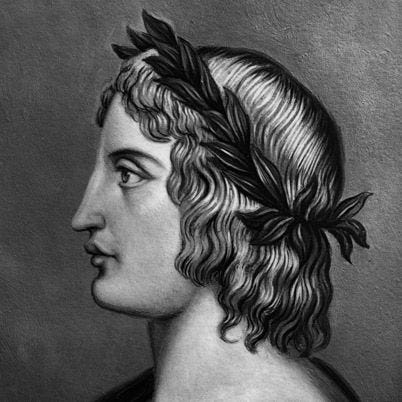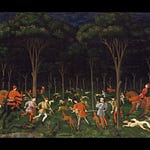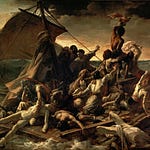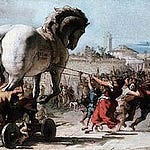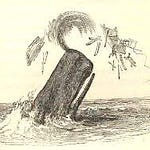Today William and I will begin a series on Virgil’s Aeneid. The basic plan of each session: William will read, both beautifully and elegantly (stopping to add summary remarks), a book of John Dryden’s translation of the Aeneid. Then, as he rests his seared vocal cords, I’ll offer a short interpretive presentation on the book. Finally, we’ll go back and forth about the day’s reading. In this way, we’ll create a beautifully read audio book that contains an interpretive dialogic essay for each book.
William will also be publishing the audio over on his substack which you should already have subscribed to. He will post his own separate essay, so make sure to check that out each week! I’ve already seen a draft of his first essay and it is outstanding.
Here is a written version of my interpretive remarks for those who prefer it over the audio:
1) Lines 1 – 41 Proem
The opening lines of an epic poem are important. The opening lines of the Iliad tell us that the poem is about the wrath of Achilles. The opening lines of the Odyssey tell us that the poem is about a man of many ways—Odysseus. The Aeneid is said to be about arms and a man—Aeneas. Could these opening words be a pointer back to Homer?—namely, the arms as Dryden has it, and wars as Fagles has it, point back to the Iliad and the man points back to Odysseus? In some sense, Aeneas goes on an odyssey, experiencing Scylla and Charybdis and the Cyclops, and he will fight in wars, thus matching the deeds of Odysseus and Achilles, but he will also go one step further: he will found, arguably, the greatest people ever to rule on the earth. Perhaps this is Virgil’s declaration that he intends to overcome the Homeric tradition?
Another way in which Virgil perhaps claims to be outdoing Homer is that he says that he is doing the singing. It is not until the 9th line that Virgil calls on the Muse; he asks her to give the causes of Juno’s anger. That she is angry is manifest; the cause of her anger is more difficult, in Virgil’s view, to uncover. Moreover, Virgil calls Juno “cruel” and we might wonder if this is a criticism of her insofar as Aeneas is described as a just and pious man. There is a lack of correspondence between the kind of treatment that Aeneas merits and the kind of treatment that he receives. Virgil seems puzzled as to how or why a divine being would be so angry. What has to be true of a god in order for it to be angry?
The angry Juno finds herself in an embarrassing situation, because she is a partial cause of her misery insofar as in the Iliad, Zeus described her as so hateful toward the Trojans that she would eat their flesh raw should the occasion present itself. Insofar as she played a role in destroying Troy, she sowed the seeds for the eventual destruction of Carthage.
In her book, Vergil’s Empire, Eve Adler argues that the core themes of the book are: Carthage, anger, and Rome. “The Aeneid proposes to present and decide the contesting claims of the two types of city to be the well-founded city—the city that has the key to rule of anger in the souls and city of men; the city therefore, that has the rightful claim to be king of the nations” (6). So we see Aeneas land at Carthage, be tempted to stay at Carthage, and go on to found Rome. We will have to see what kind of regime Carthage is, or the kind of temptation that it and Dido represent.
2) Lines 42 – 199 Juno uses the Aeolians to produce a storm; Aeneas and 7 ships get to shore; food is procured.
Juno asks the Aeolians (the friendly wind people from the Odyssey) to produce catastrophic weather conditions for Aeneas and his men. Aeneas’s reaction is interesting. He doesn’t beg for his mother, Venus, to come save him. He just laments that he would have preferred to die on the battlefield. There is something more humiliating about dying in this way for a man who is a true warrior (one could recall Achilles nearly drowning or Odysseus swimming at sea for days). Neptune brings this episode to an end and he brutally chastises the wind for meddling in his watery domain. In this way, Virgil highlights in a sense that it is difficult to fully separate the wind from the water. They cannot help but overlap, and so clashes between the divine authorities that oversee them cannot help but emerge.
Aeneas’s remaining men get to shore and Aeneas immediately scouts the terrain and secures meat for his men. One gets the sense that he cares far for his men than Odysseus did for his. I wonder if Odysseus principally sees Ithaca and his men as an occasion for his attempt to make sure that he wins undying fame.
Venus goes to Jove wondering if the destructive storm is a sign that he has changed his mind about the fate of Aeneas. Jove says that he resolve is firm and goes into detail about the future of the Romans and how Aeneas will found the city that ultimately, not only overcomes the Greeks, but in the end, brings about perpetual peace: “The terrible Gates of War with their welded iron bars will stand bolted shut…”. Eventually, according to Jove, the world will be in harmony because one people will rule over all nations. The polytheistic character of man will give itself over to one rule. Does that mean that gods will also be able to sort out their differences? Will they be able to merge their wills into a single will?
3) Lines 200 – 507 The Trojans try to figure out what to do next; Aeneas and Achates go into the forest and meet Venus in disguise and learn about Dido / Carthage.
Strikingly, Aeneas is able to see through Venus’s disguise in the forest. Venus is willing to alter her perfect appearance, but she is not willing to make herself uglier than a goddess or at least goddess adjacent human being. At any rate, Venus tells Aeneas that he should turn to Carthage for help. She also informs Aeneas that, miraculously, the ships destroyed by Juno’s Aeolian storm have all been restored. Rather than being deeply moved by this account, Aeneas is hurt that his mother does not stay longer or give him a hug: “Why can’t we clasp hands, embrace each other, exchange some words, speak out, and tell the truth?” Aeneas is emphatically not Odysseus. He is simple and decent; he is not polytropic.
4) Lines 508 – 908 Aeneas and Achates go to Carthage while in a cloud; they see scenes from the Trojan war; their comrades who they believed were lost in the storm arrive.
In Carthage, there is a giant temple devoted to Juno. There are large paintings, perhaps not unlike frescoes, on the exterior walls of the temple that depict the Trojan War.
These are the images:
- of Achilles being savage to both Agamemnon and Menelaus and Priam at the same time.
- Fighters circling Troy
- Greeks being routed by young Trojan men
- Trojans being routed by Achilles in his chariot
- The night raid from book 10 of the Iliad
- Troilus being killed by Achilles – this is especially interesting because this does not happen in Homer’ Iliad.
- Trojan women moving toward Athena’s temple (Athena
- Hector being chased three times around the walls of Troy and Achilles trying to sell Hector’s body for gold – this is interesting because I think it would be especially hard to depict running around the walls 3 times unless the painter relies on the viewer knowing the allusion; and furthermore, at least in the poems that have come down to us, Achilles certainly does not try to sell Hector’s corpse. He certainly tries to repeatedly humiliate the corpse by dragging it around with his chariot. But in Book Nine he turns down a shining ransom from Agamemnon, so it doesn’t seem like Homer depicts Achilles as greedy for gold. Virgil depicts Achilles as he worse than he is.
(I don’t know what kind of access Virgil had to Homer’s texts. If he has what we have, he could be pointing to the idea that there are always distortions when stories cross bodies of water, etc. Alternatively, if he has texts which are no longer extant, he might be pointing to them. He also might wish to make the Greeks appear worse than they were in order to enhance Rome’s glory)
- Finally, Aeneas sees himself in addition to Amazonian women
Eve Adler points out that when Aeneas first sees Carthage, he sees people picking building sites, drafting laws, electing judges, a senate, working on a harbor…but the temple or signs of concern for the gods seem utterly absent (lns 510 – 520). Later, when he sees the temple of Juno, the pictures do not contain the gods and though the temple is ostensibly for Juno, it would be hard to know this from the images.
Aeneas is covered by divine clouds in Carthage similar to that which concealed Odysseus while he visited the Phaeacians in the Odyssey. He witnesses his restored men come and appeal to Dido, the Carthaginian queen. He is able to hear their unvarnished opinion of him, since they believe that he very may well be dead, and that at the very least he isn’t present. “We once had a king, Aeneas…non more just, none more devoted to duty, none more brave in arms….if he is not laid low…[you] will not regret the first step you take to compete with him in kindness.” He gets to go to his own funeral!
Finally, Venus sends cupid to make Dido fall in love with Aeneas. She thinks that she needs to tip the scales in his favor because Carthage is a city that is devoted to worshipping Juno, the principle enemy of Aeneas.




